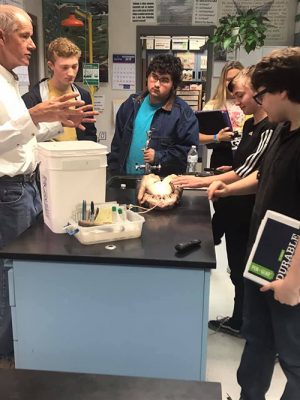
BERLIN — A Stephen Decatur High School marine biology class last week got a first-hand, up close and personal presentation on sharks from one of the foremost authorities on the subject in the region.
Captain Mark Sampson of Fish Finder Adventures last week gave a detailed, informative presentation on everything related to sharks to Mr. Jim Krall’s marine biology class at Stephen Decatur. Sampson, a U.S. Coast Guard licensed master captain and fishing guide for over 30 years, has dedicated his life’s work to researching sharks with the goal of sustaining their populations through conservation, education and outreach efforts.
Throughout much of the year, Sampson can be seen going in and out of the marina on his Fish Finder Adventures research boat on which he catches and tags various species of sharks, collects data and works to conserve the popular but still somewhat mysterious species. Last week, he enlightened Stephen Decatur High School marine biology students with stories of his adventures, pictures and video slide shows and reach-out-and-touch displays that enlightened and entertained everyone in the room.
Sampson’s extensive list of memberships and accreditations warrants his respect as the foremost authority on sharks in the mid-Atlantic region.
During the presentation, Sampson addressed every facet of sharks from their unique behavior patterns to their reproductive strategies and anatomical features. Noteworthy, were his numerous experiences working with organizations such as OCEARCH, the National Aquarium, the National Marine Fisheries Service, and International Game Fishing Association.
Sampson educated the students on various techniques of tagging, recording, handling, and collecting data on migratory sharks. He brought several tools of the trade to show the students how a shark is responsibly hooked to ensure its survival upon being released, and described how the sharks are tracked and valuable data on them are collected.
Sampson concluded the presentation with numerous jaw mounts from different species and how tooth and jaw structures are related to feeding. The students were treated to an actual mako jaw they could touch, that was in the process of being prepared by Sampson, which he does as a side business and hobby of his.
The presentation was both interesting and educational for the future marine biologist, and gave them an experience they will never forget. Sampson will be returning in the spring from Florida, where he continues his passion for learning more about the majestic creatures and will revisit Krall’s marine biology classes next semester.

